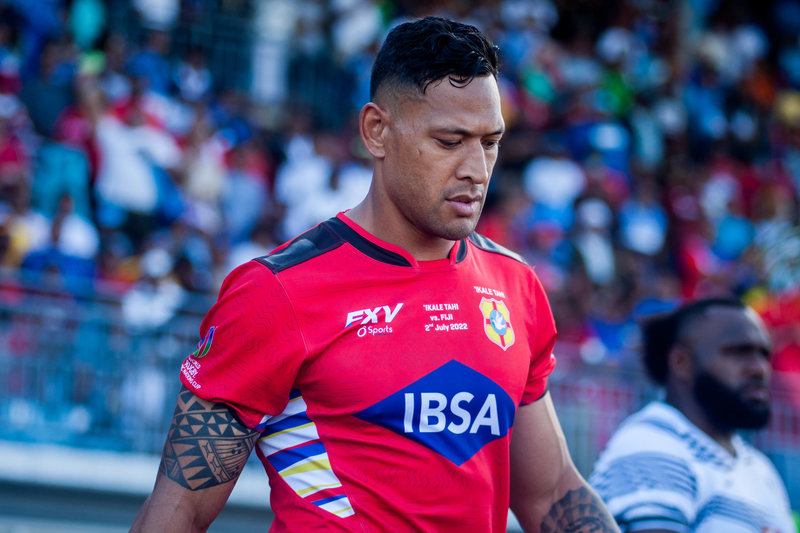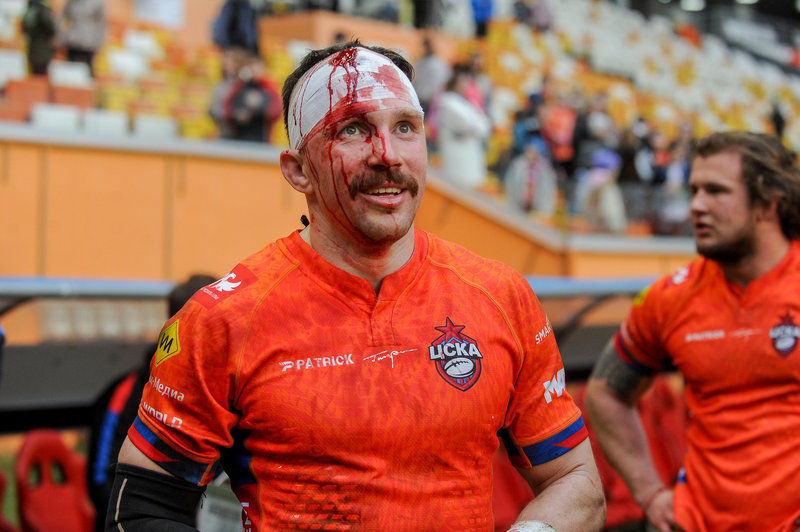In Australia, a scandal has erupted over the form of rugby club Manly Sea Eagles. Seven players from the team refused to perform in new (rugby) T-shirts in support of the LGBT community. The usual white stripes on the uniform turned into iridescent stripes, leading to a boycott by a group of athletes.
What threatens players with this boycott? Russia’s most famous rugby player, ex-captain of our team Vasily Artemiev notably for , he explains the situation and compares it to another high-profile scandal on this subject.
– The biggest story in this area happened a few years ago with the rugby player of the Australian national team, with one of the world stars Israel Folau. He is a very deeply religious person, a Christian. This is not uncommon, especially for representatives of island states – Tonga, Samoa. They are very deeply religious nations. There are many such players in New Zealand and Australia. They honor traditions, honor family.
And Israel Folau, being one of the main stars and leaders of the Australian team, allowed himself a few statements on social networks. He posted articles on the subject that homosexuality is a great sin, that all members of this community must repent as soon as possible, otherwise they will burn in hell. I think that was the wording. Naturally, this caused a great public outcry, a great scandal all over the world. Because it went against the western liberal agenda.
In this regard, Folau spilled a lot of trouble. His contract with Rugby Australia was terminated earlier than expected considering it was already the second breach. That is to say, he had already been warned before when he allowed himself such statements. And that was the second call. The contract was cancelled. And it was a lot of money – millions of Australian dollars. Players with this name usually have multi-year contracts.
Folau sued the federation and won. It was said to be an unlawful suspension of contractual obligations. Israel have moved from classic rugby to rugby league, but only now are they starting to return, after a few years, to classic rugby, because the situation has cooled down a bit. But I don’t think he will play in Australia anymore.
This scandal has been on the sports news agenda for some time. Israel had the support of associates. But this support was rather cautious. People said that a person has the right to have his own opinion, that is his deep religious statements.
In what is happening now, I see nothing unexpected. I looked up the names of the Manly Sea Eagles club, which refused to come out in that rainbow uniform. Mainly Samoan, Tongan, Fijian player names. Again, these are deeply Christian people with their own convictions. I read an interview with the head coach of the team, who apologizes to everyone who found themselves in this situation. He further lays the blame on the club’s management, who, without agreement or discussion with everyone involved, released such a collection, declaring a propaganda gesture.
Without arguing, they post this news. And it was received in different ways. Depending on what the different people play in the club, it’s normal. Ethnically different, with different religious beliefs. It was wrong to conclude such resounding news without agreement. This is a management error that now affects many people. The scandal moved from the sports agenda to the political sphere.
I read the latest headlines and related articles. He said three out of seven people who took a principled stance on that form changed their minds. Most likely, this is still unofficial information and speculation.
Is this some kind of shock to me? No. Among my acquaintances, there are deeply religious people who perceive what is happening in the world in different ways. Knowing the guys from Samoa and Tonga personally, I understand that it can be difficult for them to perceive things that are considered commonplace for a modern Australian. They go there to play rugby. It’s what they love and do best. And when there is a foreign program, contrary to their beliefs, then, of course, it must be coordinated.
There I agree with the coach: we have to decide. We live in a world where there are many different agendas and not all are viewed in the same painless way by society. There are people who are loyal to the LGBT movement and there are people who are deeply religious. Calling these monsters and others, in my opinion, is wrong. They have different opinions on what is acceptable and unacceptable in our time.
For my part, I understand that this can happen and does not happen for the first time. Australia re-engaged.
– Will there be a sanction for players who refused to wear the rainbow uniform?
They are more likely to try to maintain some sort of status quo. They had never played rainbow rugby before. The situation changes and they react. They are not the first to make contradictory statements out loud that go against the agenda, but simply say: we do not agree to play in this form.
From this point of view, I understand them. Again, they have their own religious beliefs that they were raised with. For many decades they lived in a conservative society, and now global issues and the liberal agenda are falling on them. Therefore, I see nothing wrong with what they are doing. I really think their club should rethink their actions.
I don’t think they will be punished in any way. Judging by the words of the coach, there is no talk of punishments and sanctions for them. Unlike the same Israel Folau, they did not allow themselves any offensive words. And in general, being offended is everyone’s choice. We also have to remember that.
This situation directly affected them, they expressed their opinion that they did not want to perform in this form. I think a few days will pass and everyone will forget about it. If the situation is not warmed up from the outside.
It happens again in Australia. Is it possible in the UK, where you played for many years? What would be the reaction there?
– When the story with Israel Folau happened, his friends who play in England allowed themselves to say something. They talked about the fact that a person has the right to a personal opinion, to his beliefs, that one cannot cancel it and consider him as a kind of sub-human. As a result, they achieved quite a tangible reverse effect. British society did not come to their defense very positively. I won’t say they paid dearly for their words, but they got a pretty harsh response, including from the media.
Therefore, those who live in England are very careful in their declarations. They understand that there are things that shouldn’t be said out loud, especially if you’re a famous athlete. It is better to play sports and try not to touch it, even if it affects your compatriot.
In Australia, there are many more people from Tonga and Samoa. They have already assimilated, in particular through rugby, through sport. It is one of the possible social rises that allows you to leave the village, live a different life and earn money. In Australia, this community is much stronger and wider, so guys with such beliefs have a lot more supporters. But, of course, they will suffer, will have suffered or will continue to suffer a certain ostracism. Because we are all well aware of the acceptable social agenda in Western countries and understand what effect this can have.
– When you performed in the UK, did you receive any statements?
– Not. First, I usually think before I speak. Second, I was perhaps in the minority, so to speak. However, I am from Russia, I played rugby in England. At that time, I think there were two or three of us.
There were stereotypes in British society towards Russians. But I won’t say they treated me differently. To be honest, I can’t remember any episode that caused any kind of resonance. My job was to play rugby, not to make political or cultural statements. I just tried to do what I do best.
– Have you already had actions in favor of such and such a movement?
– Every year in November we support, and here in Russia I try to support the month of men’s health. So one time I grew a mustache. It started in 2009-2010.
Every November, every rugby player grows a mustache. This month is called Movember. Month of support for a charitable foundation that focuses on men’s health, testicular and prostate cancer. Purely male diseases. It is very important. We supported this mission during our stay in England. Money was collected on this action and mustaches were left to grow for almost the entire team.
Source : MatchTV





